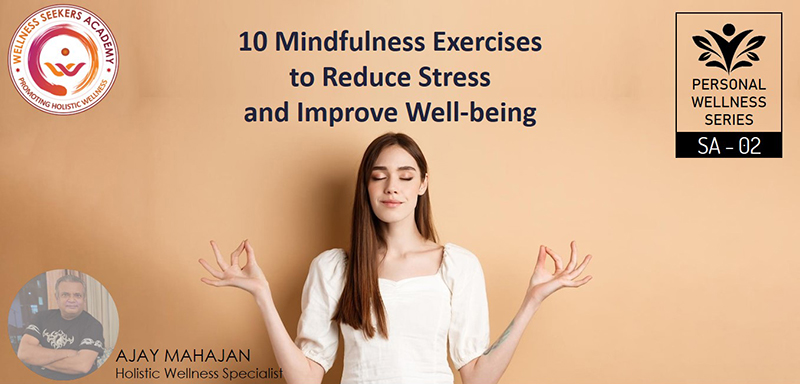
In our fast-paced and busy lives, stress has become a common companion. The constant demands and distractions can take a toll on our mental and physical health. However, incorporating mindfulness exercises into our daily routine can help us find calm amidst the chaos and improve our overall personal wellbeing.
Let us explore ten effective mindfulness exercises that can help reduce stress, increase self-awareness, and enhance our overall sense of well-being.
· Mindful Breathing
One of the simplest yet most powerful mindfulness exercises is mindful breathing. Take a few minutes each day to focus your attention on your breath. Find a quiet space, sit comfortably, and close your eyes. Slowly inhale through your nose, noticing the sensation of the breath entering your body. Then, exhale gently through your mouth, observing the sensation of release. Directing your attention to your breath brings you into the present moment, calming your mind and reducing stress.
· Body Scan Meditation
Body scan meditation is a practice that involves systematically scanning your body from head to toe, bringing awareness to each part. Start by finding a comfortable position and taking a few deep breaths. Begin at the top of your head, slowly moving your attention downward. Notice any sensations, tension, or areas of relaxation in each body part. This exercise cultivates a sense of body awareness and helps release physical tension, promoting relaxation and reducing stress.
· Mindful Eating
Mindful eating involves paying full attention to the experience of eating. Slow down and savour each bite, noticing the taste, texture, and aroma of the food. Engage your senses fully and observe the sensations in your body as you eat. By eating mindfully, you become more attuned to your body’s hunger and fullness signals, fostering a healthier relationship with food and promoting a sense of satisfaction.
· Gratitude Practice
Practising gratitude is a powerful mindfulness exercise that shifts our focus to the present moment and cultivates positive emotions. Each day, take a few moments to reflect on what you are grateful for. Write down three things you appreciate in a gratitude journal, or simply mentally acknowledge them. This practice trains the mind to notice the blessings and small joys in life, fostering a sense of contentment and reducing stress.
· Walking Meditation
Walking meditation combines the benefits of mindfulness and physical movement. Find a quiet outdoor space and walk slowly, paying attention to each step. Notice the sensation of your feet touching the ground, the movement of your legs, and the rhythm of your breath. Engage your senses by observing the sights, sounds, and smells around you. Walking meditation allows you to reconnect with your body, calm your mind, and enjoy the present moment.
· Loving-Kindness Meditation
Loving-kindness Meditation involves cultivating feelings of love, compassion, and goodwill towards yourself and others. Find a comfortable position, close your eyes, and repeat phrases such as “May I be happy, may I be healthy, may I live with ease.” Then, extend these wishes to loved ones, acquaintances, and even difficult individuals. This practice enhances feelings of empathy, kindness, and connection, reducing stress and fostering a positive outlook on life.
· Mindful Technology Use
Technology has become a significant source of stress and distraction in our lives. Practising mindful technology use involves setting boundaries and being intentional about how we interact with digital devices. Allocate specific times for checking emails and social media, and avoid mindless scrolling. Notice how technology affects your thoughts, emotions, and overall well-being. By bringing awareness to your digital habits, you can reduce stress and create a healthier relationship with technology.
· Mindful Communication
Mindful communication involves being fully present and attentive during conversations. Practice active listening by giving your full attention to the person speaking, without judgment or interruptions. Notice your own reactions and thoughts, and respond with kindness and empathy. Mindful communication fosters better understanding and deeper connections and reduces misunderstandings and conflicts, leading to improved relationships and overall well-being.
· Mindful Pause
In moments of stress or overwhelm, take a mindful pause. Find a quiet space, close your eyes, and take a few deep breaths. Observe your thoughts and emotions without judgment, allowing them to come and go. This pause allows you to respond consciously rather than impulsively. It provides a sense of clarity and calm, helping you make wiser choices and reducing stress in challenging situations.
· Mindful Gratitude Walk
Combine the benefits of gratitude and walking meditation by practising a mindful gratitude walk. Take a leisurely stroll in nature and notice the beauty around you. With each step, express gratitude for something you observe—a blooming flower, a gentle breeze, or the sound of birds chirping. Engaging your senses and expressing gratitude during the walk enhances the calming effects of nature, promoting relaxation and well-being.
To conclude, incorporating mindfulness exercises into our daily lives can have a profound impact on our well-being.
By cultivating present-moment awareness and focusing on the here and now, we can reduce stress, increase self-awareness, and improve our overall sense of well-being. Whether through mindful breathing, body scan meditation, or gratitude practice, each exercise offers a unique pathway to inner calm and resilience. By committing to these mindfulness practices, we empower ourselves to navigate life’s challenges with greater ease and embrace a more fulfilling and balanced existence.
Ajay Mahajan | Holistic Wellness Specialist
Founder & CEO – Wellness Seekers Academy
+91 96548 89815 | ajm@ajaymahajan.info
